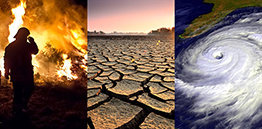Current Courses
AOSC 123: Causes and Implications of Global Change
 Responsible policy and decision making on issues related to the global environment requires understanding of the basic scientific issues, relationships between the geophysical and biological sciences, the impacts on regional and global endeavors, and the political manner in which humans respond. This course embodies an integrated introduction to the broad scientific and social aspects of the global change problem.
Responsible policy and decision making on issues related to the global environment requires understanding of the basic scientific issues, relationships between the geophysical and biological sciences, the impacts on regional and global endeavors, and the political manner in which humans respond. This course embodies an integrated introduction to the broad scientific and social aspects of the global change problem.
AOSC 200: Weather and Climate
Broad survey of the state of knowledge and problems of atmospheric science. Origin and structure of the atmosphere, meteorological observations, weather maps, forecasting, satellites, energetics, wind, general circulation, storms, severe weather, climate change, air pollution.
AOSC 247: Scientific Programming, Python
This is a comprehensive introductory course designed to prepare students to apply scientific computation and visualization techniques in Python to data intensive questions in the Natural Sciences. The class emphasizes real-world applications, providing students with essential hands-on experience using Python for data analysis and visualization, developing analytical skills for observational and modeling data, and performing virtual experiments to distinguish data contributing factors. Students will also master the command line Linux environment. Topics will include text editing, directory structure, permissions, file transfer techniques, shell scripting, and data archiving.
This course has three educational goals:
- Python programming centered around scientific data analysis and visualization.
- Working with real world data sets, including the challenges real data presents.
- Mastering command line linux. Topics to include remote server access, text editing, directory structure, permissions, file transfer techniques, shell scripting, and data archiving.
These goals will be bridged with homework plus exercise assignments utilizing both mathematical and programming skills to examine Earth’s climate data, both observed and modeled, accessible to the public. The analysis and programing skills learned can be more generally applied to other scientific data with variations in time and/or space. Students will use climate change data to explore signal vs noise, trend vs periodicity, natural vs anthropogenic forcing, local vs remote response, mean vs extreme changes, and accuracy vs uncertainty.
AOSC 399: Independent Study in Academic Peer Mentoring
AOSC 399-3401 is an independent study course of the Academic Peer Mentoring program (AMP) collaboration with AOSC, providing academic credit for the time spent directly working with students to apply evidence-based pedagogies and advance learning outcomes. Each AMP participating in the AOSC program as a Peer Mentor is guided, supervised, and evaluated by the Faculty Supervisor (FS) and the AOSC AMP Program Director (AAD).
tudents working as an AOSC Peer Mentor will be expected to support the educational objectives of the AOSC program:
- Actively expanding their understanding of course materials,
- Improving their mentoring and teaching skills,
- Serving as a mentor and advisor to the current students enrolled in the assigned AOSC course, and
- Providing additional support, as deemed appropriate by the Faculty Supervisor and the AOSC AMP Program Director, to ensure the program runs smoothly.
AOSC 652: Analysis Methods in Atmospheric and Oceanic Science
The objective of the course is to provide students experience in the development of Python and FORTRAN code to solve a variety of numerical problems they are likely to encounter during their dissertation research and subsequent careers in atmospheric and oceanic science. This course is composed of hands on lessons in the development of code to solve a variety of numerical problems and to visualize data in manners common to these fields. Numerical method theory will be taught through the analysis of actual atmospheric and oceanic data records. For instance, the lesson plan on Multiple Linear Regression will be based on analysis of the global mean temperature record, from 1900 to present, tabulated by the Climate Research Unit of the University of East Anglia. The lesson plan focused on Fourier Analysis will be based on the proxy for temperature preserved in the Vostok ice core.
Students will be exposed to Python and FORTRAN in a Linux environment. We will work with data from NASA satellites written in modern file formats such as HDF5 and NetCDF and students will be exposed to advanced graphical capabilities of Python.
